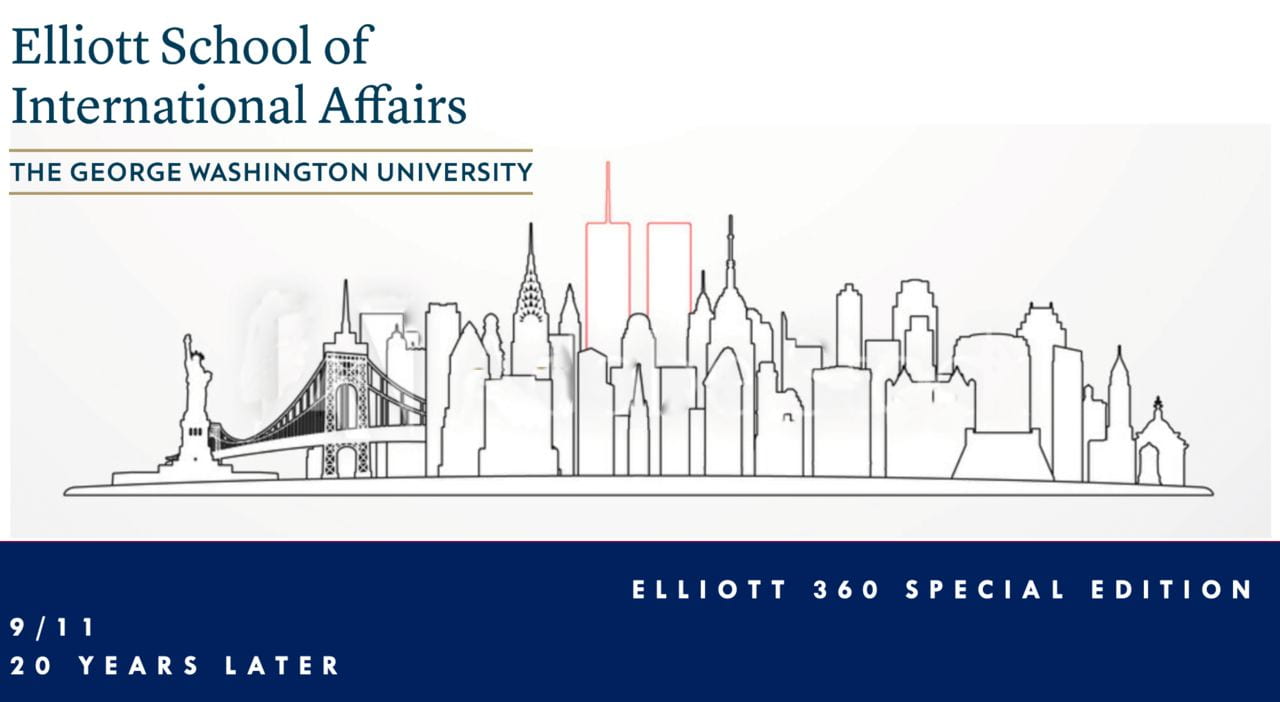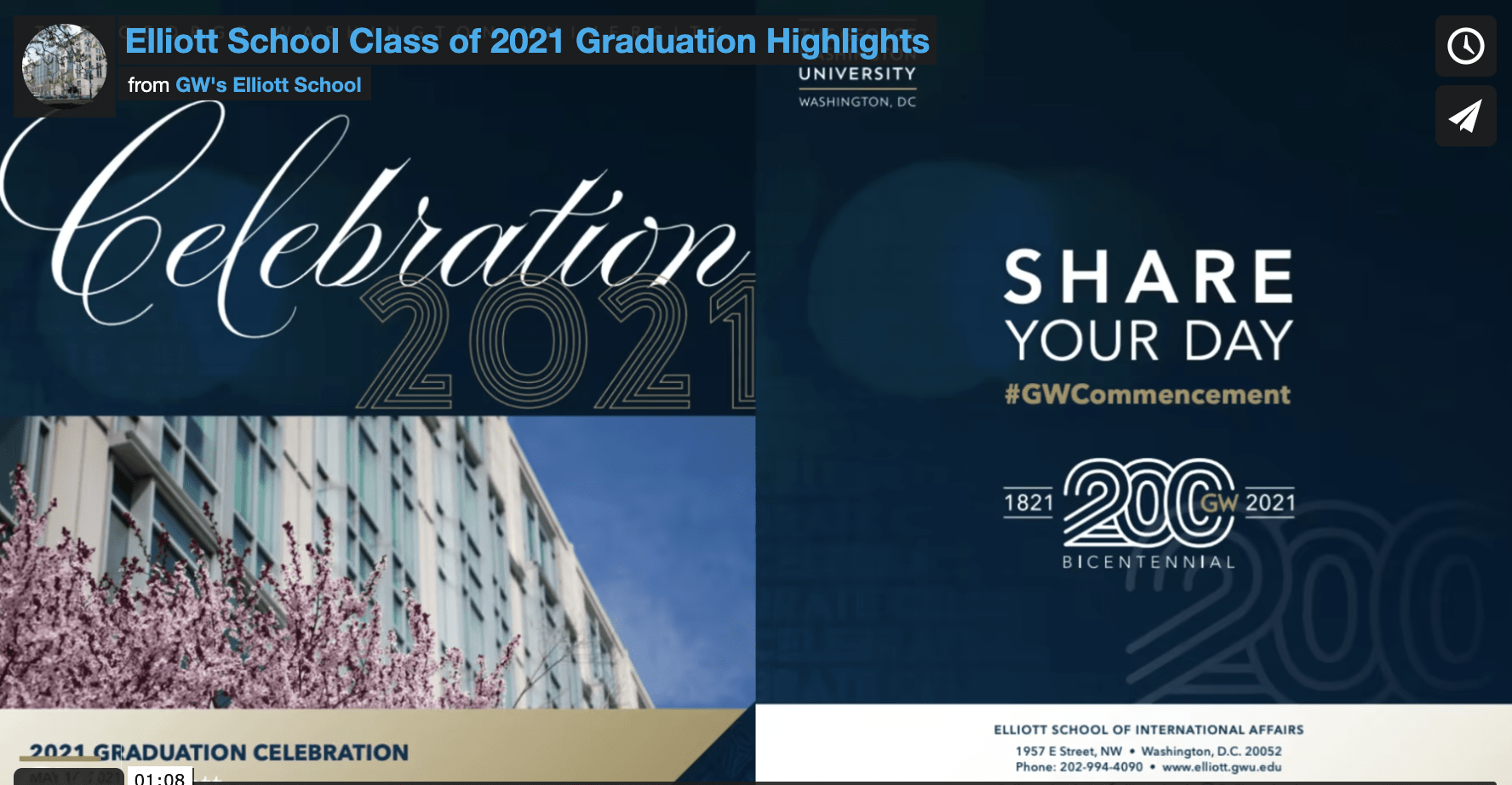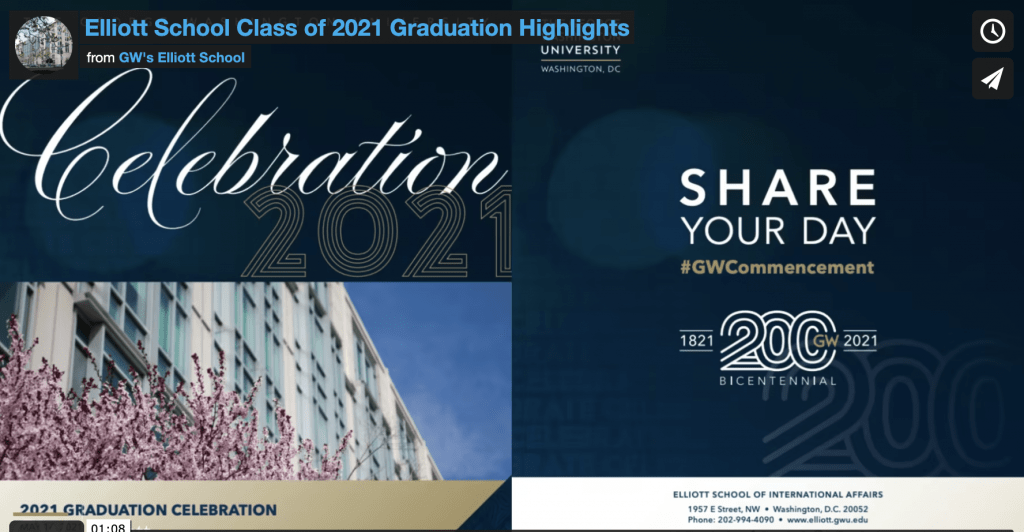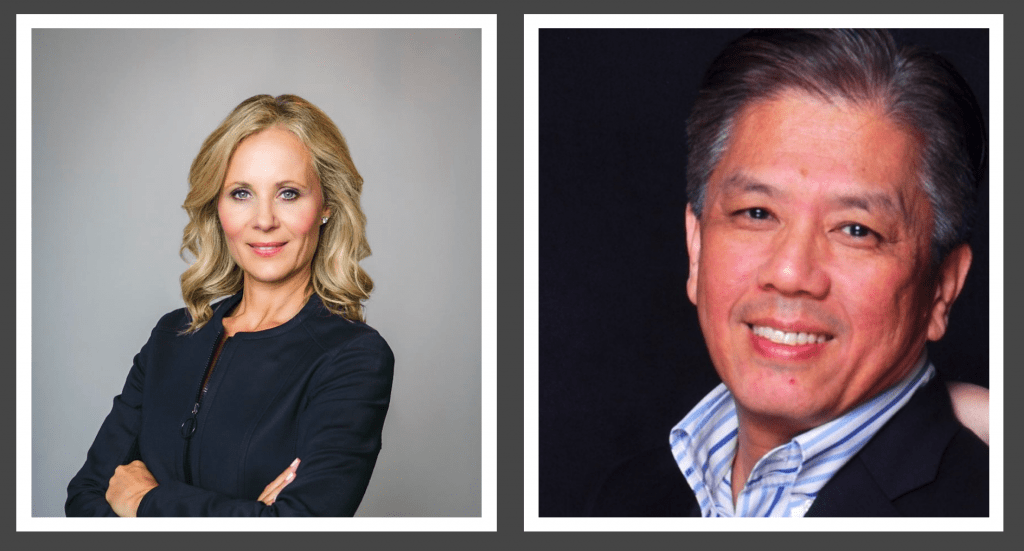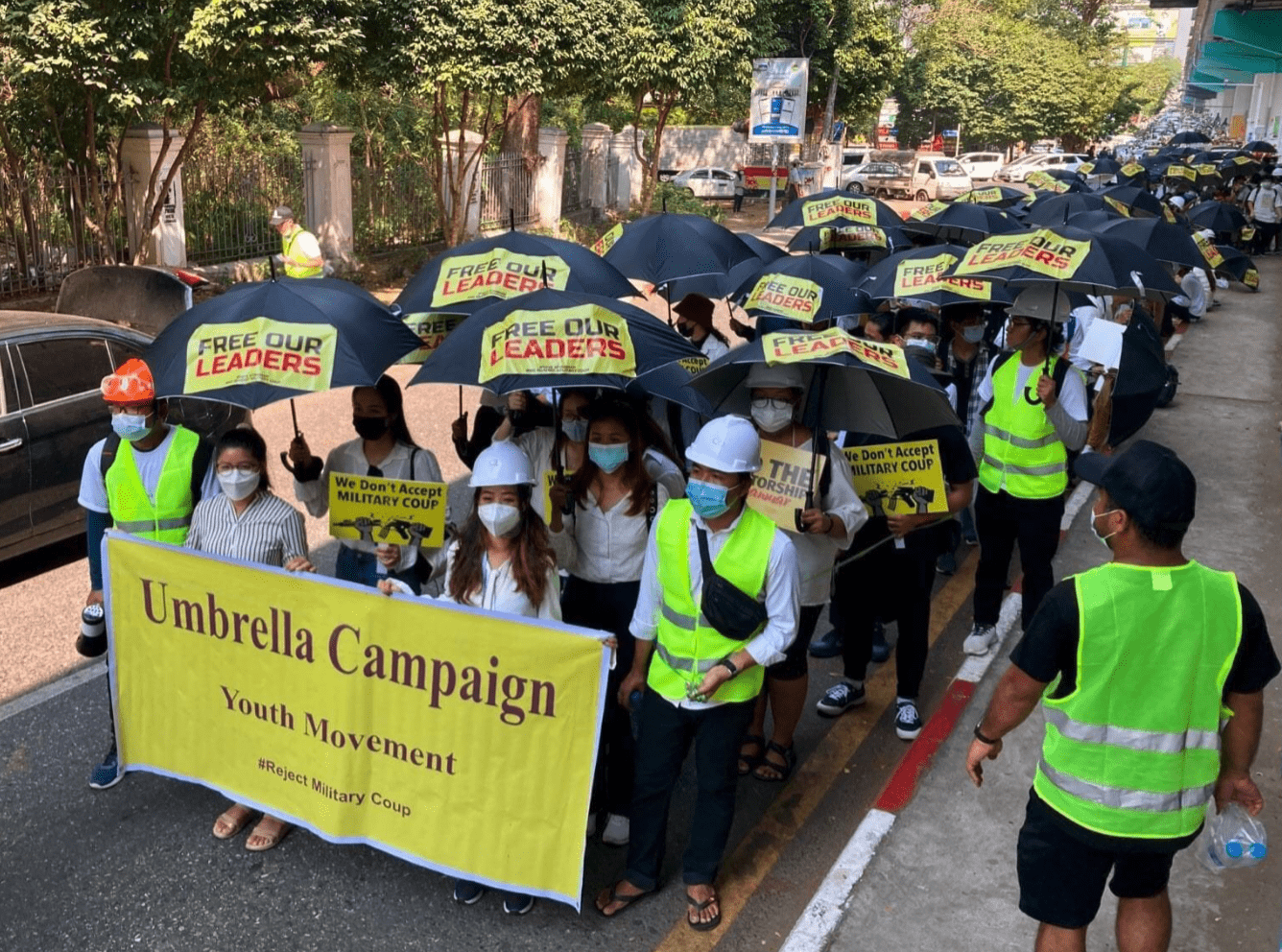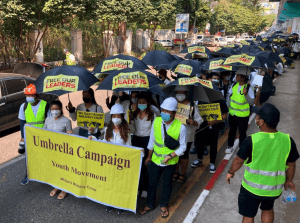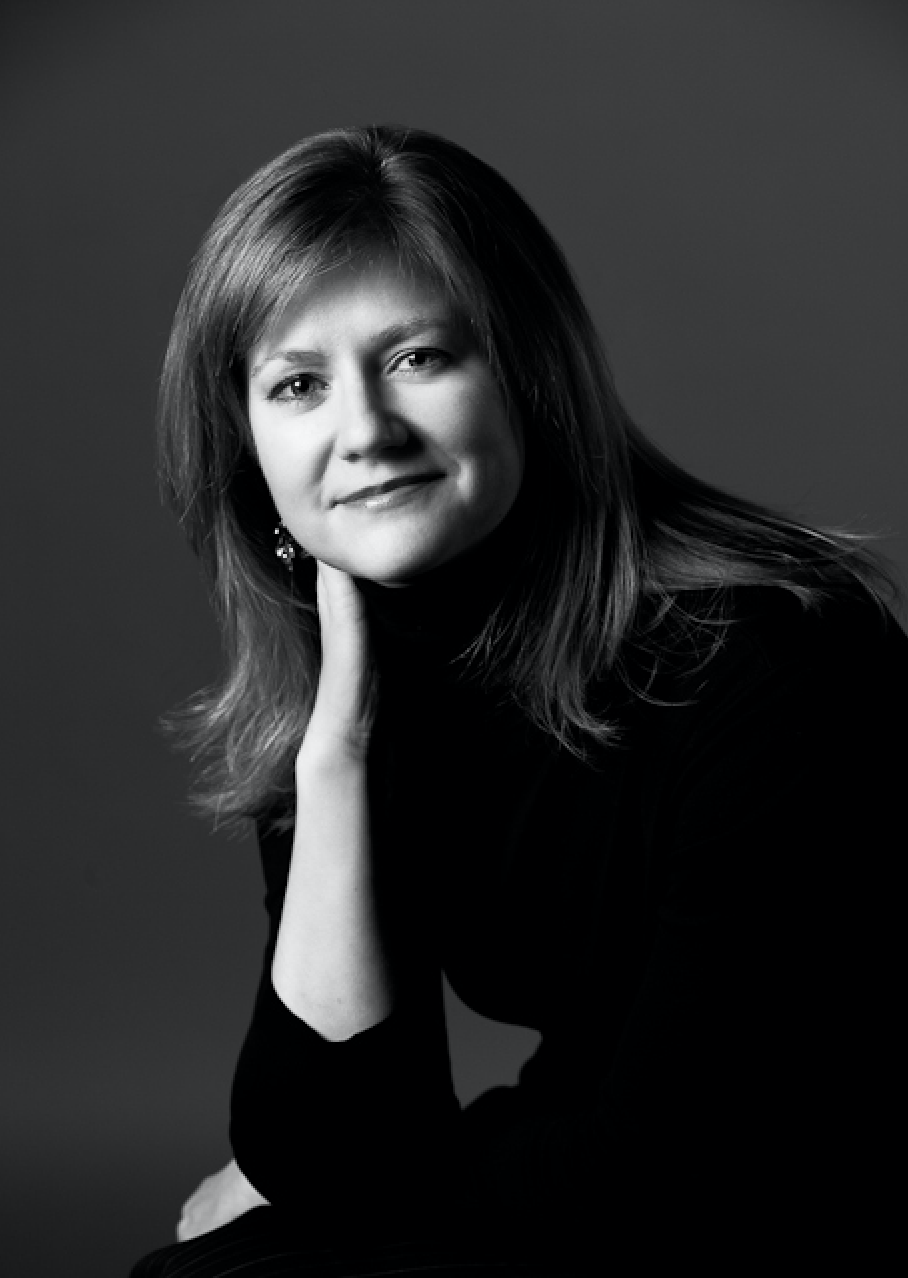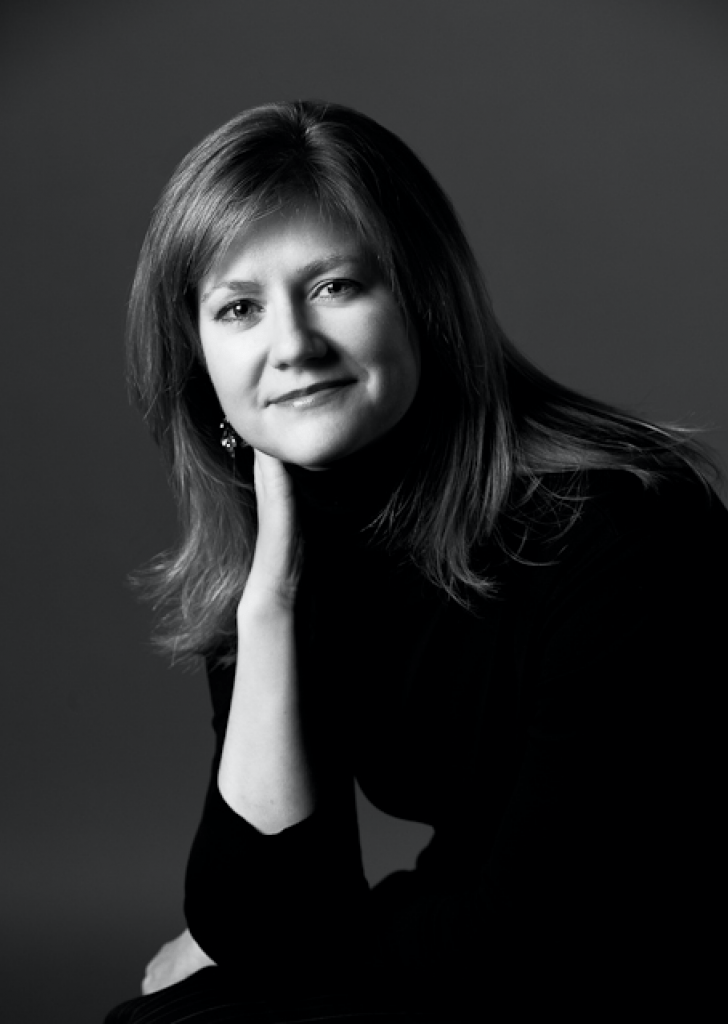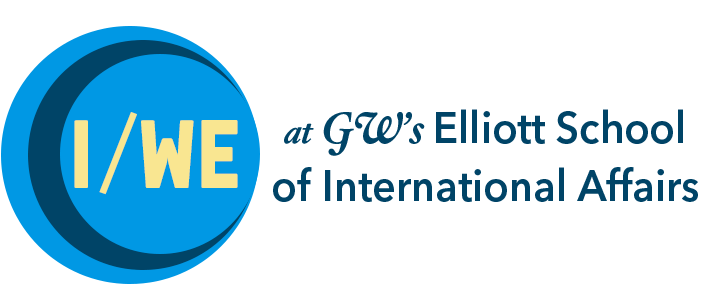The graduation celebration recognizes the achievement and hard work of every student at the Elliott School. Each year, the school presents awards for outstanding scholars, ethical leaders, students who demonstrate a commitment to public service, students who aspire to a career in public diplomacy, and students who exemplify the qualities of leadership in international affairs. In addition, the Elliott School honors the outstanding achievements of the dean’s scholars, a highly-selective two-year program for Juniors and Seniors in the Elliott School. Meet these exceptional Elliott School graduates of the class of 2021. Raise High!
Undergraduate Awards
The Distinguished Scholar Award recognizes an undergraduate student for superior academic achievement. Jacob Winn was a Fall 2020 Elliott School graduate, having earned the Bachelor of Arts degree in international affairs and political science. He was a member of the Dean’s Scholars Program and was inducted as a member of Phi Beta Kappa. Jacob’s research on the influence of the Brexit movement on the British Conservative Party will be published in Cornell University’s International Affairs Review, the ESIA Dean’s Scholar’s Journal, and the GW Undergraduate Review and he has presented his findings at a number of research conferences and symposia, including the University of Pittsburgh’s European and Eurasian Undergraduate Research Symposium. During his time in Elliott, Jacob interned at the Office of Personnel Management, the Democratic Governors Association, the House Energy and Commerce Committee, and the Massachusetts Democratic Party.
The Edward “Skip” Gnehm Leadership, Ethics, and Practice Prize is awarded to an undergraduate or graduate student who has demonstrated leadership and ethical thinking during their GW tenure. Ana Paula “AP” Velasco is a candidate for a Bachelor of Arts degree in International Affairs with a concentration in Conflict Resolution and a minor in Film Studies. During her time at GW, she has served as the Content Director for TEDxFoggyBottom, one of the largest student-run TEDx organizations in the world, and the Elliott School Film Series Lead and Moderator for the Leadership, Ethics, and Practice (LEAP) Committee. AP was active in the 2020 Presidential Election as a Communications Intern for Dr. Jill Biden’s team on the Biden for President Campaign, was one of 37 Presidential Inaugural Committee Volunteers during the Biden-Harris Presidential Inauguration in Washington D.C., and later served as a Programs and Advocacy Assistant at Issue One. AP is a Research Fellow for the Gender Equality Initiative in International Affairs (GEIA) mapping gender in current academic curriculum and is completing her time as the youngest cohort member at American University’s WeLead Campaign Program, a bipartisan initiative that trains young women to run for office.
The Edward “Skip” Gnehm Leadership, Ethics, and Practice Prize is awarded to Hezel Haehnel, a candidate for a Bachelor of Arts degree in International Affairs with a concentration in International Development Studies and a minor in Economics. She is a member of the University Honors Program and an active leader in the GW community. Hezel has served as an intern for the U.S. Department of Commerce working on various projects related to U.S.-African trade relations. She has also conducted an independent research project on Sino-Ethiopian economic relations, served as a Generation Teach teaching fellow, led the GW Ethiopian-Eritrean Students Association, and organized a fundraising campaign for personal care products in Ethiopia. Upon graduation, Hezel will continue her career in global trade advisory.
The Wilbur J. Carr Memorial Award is awarded to one undergraduate and one graduate student who demonstrates outstanding ability in the study of international affairs while displaying the qualities necessary to be a good citizen and dedicated public servant. Manush Mobarhan is a candidate for a Bachelor of Science in International Affairs, with a concentration in International Politics, and Economics. She spent two of her semesters at GW studying abroad in Santiago, Chile and Paris, France. Manush has worked at the Elliott School’s Institute for Middle East Studies since her first year at GW, as well as other internships at the Fulbright Association, the Ibero-American Center for the Rights of Child, and Bates White Economic Consulting. She has also been an active member of Delta Phi Epsilon Professional Foreign Service Sorority, serving as Secretary her junior year and President her senior year. Manush will be staying in DC after graduation working as a consultant at Bates White, with plans to attend law school in the future.
The John Henry Cowles Prize is awarded to the student who combines overall scholastic achievement with leadership potential. Anthony Vetrano is graduating with a Bachelor of Arts degree in International Affairs with a concentration in International Politics and a minor in History. During his time at GW, Anthony has worked as a Colonial Inauguration Leader, a Resident Advisor, and a ‘STAR’ Tour Guide. He also worked as a Peer Advisor where he co-taught the Elliott School First Year Experience course. This past year Anthony has completed internships at World Vision International and the U.S. Department of State. Finally, Anthony has been highly active in student theatre organizations, directing a full-length musical and serving as the Artistic Director of Generic Theatre Company.
The Norman H. Friend Prize is awarded to an undergraduate who combines overall scholastic achievement with leadership potential. Soenke (Zeungkuh) Jordan is a candidate for a Bachelor of Arts degree in International affairs with a concentration in International Development. In Spring 2021, he conducted qualitative research with his Senior Thesis titled “Censorship, Surveillance, and State Power in the Chinese Internet.” As a student-athlete, Soenke is the captain of the GW Varsity Sailing Team. Representing GW in over 25 sailing competitions during college, including at the Singlehanded National Championships early this May, he is set to (contingent upon qualification). After graduation, Soenke plans to work in a role that revitalizes the transatlantic partnership between the US and the EU.
Graduate Awards
The Elliott School Graduate Student Prize is awarded annually to an Elliott School graduate student who, in the opinion of the dean and the faculty, deserves recognition for academic achievements and contributions to the life of The George Washington University. Anna Rose Agnes is a candidate for a Master of Arts degree in Security Policy Studies with a concentration in Cyber and Technology. She is a recipient of the Department of Defense Cybersecurity Scholarship (CySP). Anna is very proud of her tenure as the Chair (and Co-Chair) of the Security Policy Studies Student Board, helping it to grow into the wonderful organization it is today. During her time on the Board, she has enjoyed countless opportunities to work with amazing students, faculty, and staff to put together exciting speaker series events and other programming for her fellow students. Upon graduation, Anna is looking forward to working for the U.S. federal government.
The Walter Roberts Public Diplomacy Studies Award is awarded to a graduate student at the Elliott School of International Affairs for academic excellence and professional aspirations in public diplomacy. This year it is being awarded to two graduates: Saiansha Panangipalli and Halea Kerr-Layton. Saiansha’s passion for public diplomacy is evident in her internships at the Embassy of India in Washington DC, the Moroccan Embassy in New Delhi, and at PAHO. Saiansha’s brilliant writing and strategic planning skills, and her goal of working in public diplomacy after graduation exemplify the spirit and intention of the Walter Roberts Award. Halea Kerr-Layton has likewise demonstrated outstanding leadership in roles ranging from Presidential Fellow to Strategic Outreach and Engagement Coordinator at GW. She demonstrated a mastery of public diplomacy skills as an intern last summer working with Global Ties, developing and employing analytics in addition to program development and implementation on a real and virtual level. With unmatched interpersonal and analytical skills, Halea will significantly impact the field of public diplomacy as she pursues her career goals.
The Wilbur J. Carr Memorial Award is awarded to one undergraduate and one graduate student who demonstrates outstanding ability in the study of international affairs while displaying the qualities necessary to be a good citizen and dedicated public servant. Henri-Nicolas Grossman is completing his Master of Arts degree in Security Policy Studies (SPS) with a concentration in U.S. national security, having received his B.A. in War Studies and History from King’s College London. A native English and French speaker, Henri-Nicolas has researched and written on issues including Russian disinformation, insurgencies and substate threats in Africa, and great power competition in the Arctic. As a board member of the SPS Speaker Series, he hosted distinguished speakers to discuss current affairs. He interned at the Brookings Institution and on Capitol Hill and plans on serving as a security analyst in government.
Spring 2021 Dean’s Scholars
Leah Berkman is a candidate for a Bachelor of Arts degree in international affairs with a concentration in international development. She is also completing a minor in women’s, gender and sexuality studies. Her project title is ‘The Role of Civil Society in the Co-Creation of the South African National Strategic Plan on Gender Based Violence.’
Steven David Bernstein is a candidate for a Bachelor of Arts degree in international affairs with a concentration in Asia. He is also completing a second major in Chinese. His project title is: ‘Taiwan’s Defense Strategy and Artificial Intelligence.’
McKenna Quinn Burelle is a candidate for a Bachelor of Arts degree in international affairs with a concentration in international economics. She is also completing a second major in economics. The title of her research project is ‘Rural Road Connectivity and its Effects on Access to Health Care: Evidence from India’s PMGSY Project.’
Nicholas Clague is a graduate of the Bachelor of Arts degree program in international affairs with a concentration in security policy. His project is titled: ‘Sanctions Evasion, Import Substitution, and Trade Diversification: Russia’s Response to Western Sanctions on the Russian Defense Industry.’
Alex Erdman is a graduate of the Bachelor of Arts degree program in international affairs with a concentration in international politics. He is also completing a second major in Geography. His project is titled: ‘Language, Party Leadership, and the Construction of Greenlandic Identity.’
Tamara Fazylova is a graduate of the Bachelor of Arts degree program in International Affairs with a concentration in security policy and a minor in psychology. Her project is titled: ‘Russian Priorities as Understood Through the Domestic Messaging of its Military Interventions in Ukraine and Syria.’
Zoe Garbis is a candidate for a Bachelor of Arts degree in international affairs with a concentration in conflict resolution. She is also completing a minor in sustainability. Her project is titled ‘Fulfilling the Vision of Colombia’s Gender-Inclusive Peace: The Formal Reintegration of the FARC-EP’s Ex-Combatant Women.’
Maisa Munawara is a candidate for a Bachelor of Arts degree in international affairs with a concentration in conflict resolution. She is also completing a minor in psychology. Her project is titled: ‘The Indigenization of Mental Health and Psychosocial Services for Rohingya Refugees in Bangladesh.’
Eleni Christina Pappas is a candidate for a Bachelor of Arts degree in international affairs with a concentration in Comparative Political, Economic, and Social Systems. She is also completing a minor in Economics. Her project is titled ‘Displaced Producers and Reproducers: The Economics of Gender Equality in Russia.’
Anshul Rajwanshi is a graduate of the Bachelor of Arts degree program in international affairs with a concentration in security policy. His project is titled: ‘Popular Threat Perception and Encryption, a Case Study of Australia and the United States.’
John Salchak is a graduate of the Bachelor of Arts degree program in international affairs with a concentration in international politics. He is also completing a minor in history. His project is titled ‘Out of Our Domain: ICANN, Technical Organizations, and Political Challenges.’
Jacob Winn is a graduate of the Bachelor of Arts degree program in international affairs with a concentration in international politics. He is also completing a second major in political science. His project is titled ‘Brexit: A Fluke, or the Future of British Conservatism? Analyzing the Post-Brexit Conservative Party’s Populist Status Quo.’
